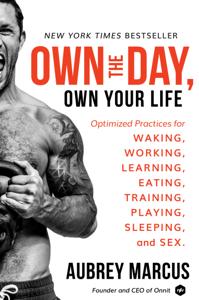
Want to learn the ideas in Own the Day, Own Your Life better than ever? Read the world’s #1 book summary of Own the Day, Own Your Life by Aubrey Marcus here.
Read a brief 1-Page Summary or watch video summaries curated by our expert team. Note: this book guide is not affiliated with or endorsed by the publisher or author, and we always encourage you to purchase and read the full book.
Video Summaries of Own the Day, Own Your Life
We’ve scoured the Internet for the very best videos on Own the Day, Own Your Life, from high-quality videos summaries to interviews or commentary by Aubrey Marcus.
1-Page Summary of Own the Day, Own Your Life
Introduction
If you want to lead a better life, one day at a time is the best way to do it. Most Americans have fallen into bad habits because they start their days with sugar or caffeine and end them by watching TV in bed. In between, they’re unhappy and tired. It’s time to break that cycle so you can feel great every day of your life.
Water. Light. Movement.
Most people have a habit of sleeping in and rushing to work. They stay in bed until they can’t delay it anymore, then rush out the door for their commute.
The first thing in the morning, you should drink lots of water and get some sunlight. You also need to move around a bit. If you don’t do these things, it will be hard for you all day long.
Many people drink coffee in the morning to wake up, but they should be drinking water instead. Coffee dehydrates you further and makes you feel tired and irritable. Many people solve this problem with more coffee, which is a bad idea because it dehydrates them even more.
To get the most out of your morning water, add sea salt to it. Sea salt helps you retain water and delivers minerals to your body, which is essential for proper hydration. Drink plenty of water throughout the day.
To start your day off right, expose yourself to blue light. This will cue your body that it’s time to wake up and get going. Next, move around for 20 minutes after you first wake up. You can do some sun salutations or go for a walk with your dog or just stretch out on the floor.
Deep Breath, Deep Freeze
Your body is capable of much more than you give it credit for. Consider Wim Hof, who’s broken many extreme sports records and has the ability to withstand cold temperatures. He’s called The Iceman and he teaches others to be able to tolerate the cold as well.
Humans were once threatened by the elements, but now we have ways to deal with them. However, people in today’s society are not exposed to these kinds of stressors. Therefore, our bodies use stress reactions for more mundane things than they did before.
When you wake up in the morning, do your light exercise routine and drink a lot of water. After that, take a cold shower to build willpower. You don’t have to stay in the cold for too long; just end your shower with some breathing exercises: breathe into your belly 50 times quickly, then exhale without any effort until you start tingling all over (this is called Wim Hof’s Breathing Technique). Repeat this cycle three times and finish by holding your breath as long as possible. This will give you more willpower when dealing with emotional discomfort later on during the day.
Eat Less Sugar And More Fat
Breakfast is not the most important meal of the day. Every meal should be eaten with care, as each one will affect your energy and emotions throughout the day. People often eat breakfast foods that are high in sugar and caffeine, which lead to a roller-coaster of emotions before lunchtime.
Breakfast is a great way to start the day. It should have all of your nutrients, like fat and protein, so that you can go through the rest of the day without feeling hungry or tired. Replace sugar with fats in your breakfast because they metabolize slower than carbohydrates do. This will help you feel full longer and give you more energy throughout the day. However, if there’s no way to get fats into your breakfast, then don’t eat it.
Drive Time, Alive Time
It’s important to think about the way you spend your time. You can either be engaged with the world or just getting through it until your next task. Most people treat their commutes as dead time, when they’re not really paying attention and are just trying to get by. However, you can change that, too.






